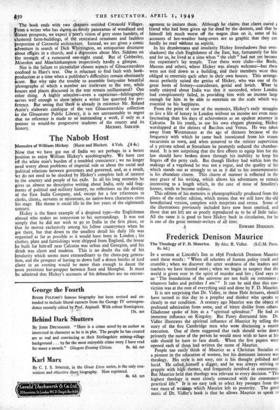The Nabob Host
ow that we have got out of India we are perhaps in a better
sition to enjoy William Hickey's autobiography. We have cast Off the white man's burden of a troubled conscience ; we no longer peed worry about problems of imperial rule or about the social and political relations between governors and governed, and, as a result, tve do not need to be shocked by Hickey's complete lack of interest in the country and people of his exile. In all his long memoirs he gives us almost no descriptive writing about India, only odd frag- ments of political and military history, no reflections on the destiny of the East India Company, and, except for a few references to clerks, clients, servants or mistresses, no native-born characters cross his stage. His theme is social life in the last years of the eighteenth century. Hickey is the finest example of a despised type—the Englishman abroad who makes no concession to his surroundings. It was not simply that he did not wish to go to India in the first place, or that he moved exclusively among his fellow countrymen when he got there, but that down to the smallest detail his daily life was organised as far as possible as it would have been in London ; his clothes, plate and furnishings were shipped from England, the house he built for him-elf near Calcutta was urban and Georgian, and his drink was claret and madeira. This is no doubt the side of his 'insularity which seems most extraordinary to the chota-peg genera- tion, and the prospect of having to down half a dozen bottles of iced claret in an evening would be more than enough to daunt the most persistent bar-propper between Suez and Shanghai. It must be admitted that Hickey's accounts of his debauches are no encour- agement to imitate them. Although he claims that claret cured a friend who had been given up for dead by the doctors, and that he himself felt much worse off the wagon than on it, some of his accounts of hot-weather hang-overs are so graphic that they can hardly be read without an aspirin.
In his drunkenness and insularity Hickey foreshadows (but over- shadows) the club Englishmen of the East, but, fortunately for him and for us, he lived at a time when " the club " had not yet become the expatriate's' lay temple. True there were clubs—the Bucks, Masons and others, where Hickey was always welcome—but these were not tied down to a building, and their members were thus obliged to entertain reach other in their own houses. This arrange- ment perfectly suited the genius of Hickey, who was one of the great hosts of history—considerate, genial and lavish, What he really enjoyed about India was that it succeeded, where London had conspicuously failed, in providing him with an income large enough for him to be able to entertain on the scale which was essential to his happiness.
From the point of view of the memoirs, Hickey's early struggles to live a life of luxury in London without an income are even more fascinating than his days of achievement as an opulent attorney in Calcutta. In his youth, to use his own elegant phrasing, Hickey worshipped at the shrines of Bacchus and Venus. He was taken away from Westminster at the age of thirteen because of the frequency with which he came back intoxicated from his truant excursions to town, and when removed to the stricter supervision of a private school at Streatham he promptly seduced the chamber- maid. It is not surprising that the first effo to equip him for the law should have broken down through his inability to keep his fingers off the petty cash. But though Hickey had within him the makings of a vagabond he was not a rogue, and the quality of his which stands out as strongly to us as it did to his contemporaries is his abundant- charm. This charm of manner is reflected in the easy grace of his writing, which allows his adventures to remain interesting to a length which, in the case of most of Smollett's heroes, tends to become tedious. This edition of his memoirs is photographically produced from the plates of the earlier edition, which means that we still have the old bowdlerised version, complete with misprints and errata. Some of the illustrations previously included have now been omitted, and those that are left are so poorly reproduced as to be of little value. All the same it is good to have Hickey back in circulation, for he is one of the great memoir-writers of all time.
EDWARD HODGKIN.






































 Previous page
Previous page